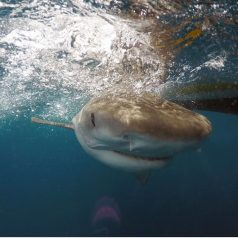
A first for Dutch waters
From the 15th to the 21st of October, eight shark researchers and support crew will embark on a unique tagging expedition organized by shark conservation program Save Our Sharks. The goal is to find out more about sharks living in the Dutch Caribbean in order to ensure protection. It is the first time an expedition like this takes place in Dutch waters.
Little is known about the current state of shark populations in the Dutch Caribbean. Even less is known about their behavior and which areas they use as nursery and feeding grounds. This kind of information is essential to ensure the long-term protection of sharks and rays in our waters. That’s why Save Our Sharks, a shark conservation program headed by the Dutch Caribbean Nature Alliance, a regional alliance of protected areas on the islands of Aruba, Bonaire, Curaçao, Saba, St. Eustatius and St. Maarten, is organizing this expedition. The project is funded by the Dutch Postcode Lottery.
The main aim of the expedition will be the tagging of highly migratory species, such as tiger sharks, with satellite tags that will allow the sharks to be tracked for up to two years. The scientists hope to discover the migration patterns of these large sharks in the wider Caribbean and beyond. Additionally, 10 sharks will be fitted with acoustic tags, which will be used to gather information on their local movement patterns on the Saba bank.
During the 7-day expedition, eight shark researchers with a support crew will be heading out to the Saba Bank to tag and track sharks. On board of the research vessel “Caribbean Explorer” are scientists and conservationists from the Saba Conservation Foundation (SCF), Nature Foundation St. Maarten (NFSXM), Florida International University (FIU) and Sharks4Kids.
“We are very excited about being able to do this research. Especially because it has never been done here before” says Tadzio Bervoets, head of the Save Our Sharks project. “The data we receive this way is vital for the implementation of meaningful conservation measures for sharks. We are very excited to learn more about these wonderful majestic creatures.”
— Photo credit for Duncan Brake —





